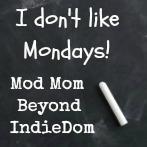The original post by Natalie the Singingfool can be found at Not as Irish as I Thought
I’m not as Irish as I thought. This has skewed my worldview a bit, and now I’m feeling culturally adrift; in the throes of an existential crisis, if I allow my flair for dramatics to take the spotlight for a moment. But I’m getting ahead of myself…
Being part-Irish has helped me situate myself in a world where culture has been wiped dry by chain restaurants and American flag-waving patriotism, with which I don’t identify because it’s so sterile. The only meaning I can extract from being American in this day and age is the value of capitalism and imperialism, and I’m not big on isms.
When I was too young to understand why, I found myself jealous of the few Jewish kids at school. In set aside class time, we studied their mysterious heritage that included dreidels and latkes and Anne Frank (I know how horrible that sounds – but these were the abstractions of a ten-year old from a white-washed public school education). Our family dyed Easter eggs and put up a Christmas tree, but it seemed so devoid of meaning. These empty traditions didn’t tie in at all with who we were and from whence we came, like the Jewish kids with their menorahs or the many Chicanos at school whose lives were full of rich tradition and two spoken languages. Those traditions help establish cultural identities, something I perceived as lacking in my young life.
My family is mostly Dutch on my father’s side of the family. Both great-grandfathers sailed over on steamships after World War I, but the only traces of that cultural legacy were a Dutch poem my Grandpa taught me and the Delft china my Grammy collected. We didn’t eat Dutch food (thankfully, it turns out – I’m not a fan of pickled herring), we didn’t hear stories of what it was like in the homeland. Our past was a blank slate that only seemed to start once the relatives stepped onto American soil. I don’t even know why they came here, actually. My fourth-generation was too far removed, I guess.
My mother’s side of the family, however, is the complete opposite – a Heinz 57 blend hailing from all corners of Western Europe, they have been here since probably before the Mayflower. A good chunk of this family, I always believed, came from Ireland, Germany and England.
Thus, the only time I felt like we vaguely had any heritage was on St. Patrick’s Day. My mother and grandmother would cook corned beef, cabbage, boiled potatoes and bake Irish soda bread. My grandmother would wear shamrock pins that invited strangers, “Kiss me, I’m Irish!” I knew all about the potato famine, even though my ancestors came to America long before that time, but I must admit, I didn’t know about the Troubles or the difference between Northern Ireland and the Republic of Ireland (that came later). All I knew was that I belonged to something larger, which was what I craved.
In college, I further identified with the Irish once I learned about the Irish language in my British Lit class. I fell in love with the Irish poets, especially after reading Nuala Ní Dhomhnaill’s Why I Choose to Write in Irish, The Corpse That Sits Up and Talks Back. In this 1995 essay, she explains the appeal of a culturally saturated language that incorporates the “Otherworld” into daily existence. Irish, an emotionally sensitive, imaginative language truly reflects the culture from which it springs. No wonder I grasped onto it with both hands. My world was being eaten alive by “…the growth of an originally Anglo-American, but now a genuinely global, pop monoculture that reduces everything to the level of the most stupendous boredom,” as Ní Dhomhnaill describes. True that.
So for most of my adult life, I’ve believed that I’m mostly Irish and Dutch. When talking with my mom the other day though, I mentioned making Irish soda bread in honor of the holiday, and mom casually mentioned, ”You know, we’re actually not that Irish. We’re probably more German. And a lot of the family we had thought was Irish was actually Scottish.”
This stunned me. I didn’t even know we had any Scottish heritage. “We aren’t? What about all those Querrys and Kerrs?” I asked.
“Kerr is actually a Scottish name,” mom pointed out. Way to expose my ignorance, mom.
I felt like I was back at square one; very mixed up and confused, like my heritage.
As I look around my office for some clues about who I am, I see my Jane Austen paraphernalia from grad school sitting on my desk hutch. My French and Italian language learning CDs are shoved in desk cubbies and my Pre-Raphaelite art prints adorn the walls. My Moroccan jewelry box sits on the dresser, my stacks of literary theory, anthologies and shelves of books hail from all corners of the globe. I see that the beauty of who I am is no longer in my family history, but the histories I’ve embraced on the way. I adopt these for my own, and I am the richer for it.
I still made soda bread, though. I will always be part Irish, even if mostly in my heart.
Linking up at Mod Mom Beyond Indiedom’s blog hop, because I Don’t Like Mondays.

